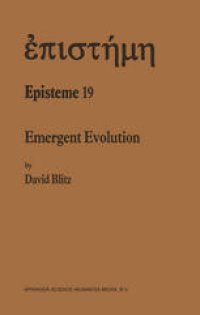
Ebook: Emergent Evolution: Qualitative Novelty and the Levels of Reality
Author: David Blitz (auth.)
- Tags: Philosophy of Science, History, Philosophy of Biology
- Series: Episteme 19
- Year: 1992
- Publisher: Springer Netherlands
- Edition: 1
- Language: English
- pdf
Emergent evolution combines three separate but related claims, whose background, origin, and development I trace in this work: firstly, that evolution is a universal process of change, one which is productive of qualitative novelties; secondly, that qualitative novelty is the emergence in a system of a property not possessed by any of its parts; and thirdly, that reality can be analyzed into levels, each consisting of systems characterized by significant emergent properties. In part one I consider the background to emergence in the 19th century discussion of the philosophy of evolution among its leading exponents in England - Charles Darwin, Herbert Spencer, T. H. Huxley, Alfred Russel Wallace, and G. J. Romanes. Unlike the scientific aspect of the debate which aimed to determine the factors and causal mechanism of biological evolution, this aspect of the debate centered on more general problems which form what I call the "philosophical framework for evolutionary theory." This considers the status of continuity and discontinuity in evolution, the role of qualitative and quantitative factors in change, the relation between the organic and the inorganic, the relation between the natural and the supernatural, the mind-body problem, and the scope of evolution, including its extension to ethics and morals.
This volume examines the background, origin, and debate over emergent evolution, a philosophy of evolution developed by the comparative psychologist C. Lloyd Morgan. Part One studies the 19th century background in the debate over the philosophical framework for evolutionary theory in the writings of Darwin, Spencer, Huxley, Wallace, and G.J. Romanes. Questions examined include the continuity of the evolutionary process, the status of qualitative as well as quantitative change, the scope of evolution, and its metaphysical implications. Part Two traces Lloyd Morgan's development of emergent evolution as a philosophy relating the various sciences, and its main thesis that qualitative novelty can occur in the course of a continuous, universal and monistic evolutionary process, proceeding from the material level to those of life and mind. The third part traces the debate over emergent evolution, and argues that, despite its temporary eclipse by reductionist and physicalist philosophies in the period from the mid-1930s to the mid-1950s, emergent evolution is an active trend of thought at the interface between philosophy and science.